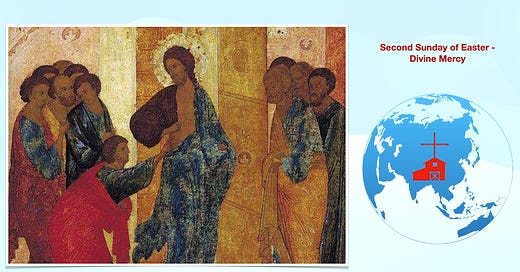Acts 2:42-47; 1 Peter 1:3-9; John 20:19-31
The word "blessed" is often associated with the sermon on the Mount (Matt. 5:3-11). Today, however, we hear yet another blessing: "Blessed are those who have not seen and yet have believed" (John 20:29). The apostles belonged to a chosen group of people who saw and touched the Word of Life (1 John 1:1). On the other hand, we, through the word of their testimony (John 17:20), belong to those who although have not seen Christ yet believe and love Him (1 Pet. 1:8).
When the risen Lord appeared to Mary Magdalene on the morning of the first day of the week, he said: "Do not touch me, for I have not yet ascended to the Father" (John 20:17). In the evening of the same day, he stood among the frightened apostles (John 20:19). What happened in between? Unlike Luke, John the Evangelist does not describe the scene of Jesus' ascension (Luke 24:50-53), but before his death, the Lord announced that he would go to the Father and then return with the gift of the Holy Spirit (John 14:28; 15:26; 16:5-7). And so the risen Lord says to the apostles, "Receive the Holy Spirit" (John 20:22) and a week later, he allows Thomas to touch his wounds (John 20:27).
"My Lord and my God" (John 20:28). John begins his Gospel with a statement: "the Word was with God and the Word was God" (John 1:1). This Word became man (John 1:14) died for us on the cross (Rom. 5:8) and was standing in front of Thomas. When Thomas spelled out his conditions to believe in Christ's resurrection, Jesus was not there (John 20:25). And yet, eight days later, he quotes those words of Thomas (John 20:27). How did he know? "O Lord, you have searched me and known me! [...] Even before a word is on my tongue, behold, O Lord, you know it altogether"(Ps 139: 1,4). The one who saw Nathanael under the fig tree (John 1:47-49) also heard Thomas speaking in the Upper Room. No creature is hidden from the Word who is God (Heb. 4:13).
The testimony of the apostles brought us to faith in Christ (John 20:31) but that was just the beginning. We have been born anew in the waters of baptism (1 Pet. 1:3) and participate in the Eucharist (Acts 2:42). And when we fell - who does not fall - we were raised in the sacrament of reconciliation (John 20:23). Our faith is indeed "more precious than gold that perishes" (1 Pet. 1:7). About one ton of gold was used in making the tabernacle (Ex. 38:24) and much more in the temple built by Solomon (2 Chron. 3:8). And yet the temple with its worship is gone, but our faith has overcome the world (1 John 5:4).
Saint Faustina, the apostle of Divine Mercy wrote: "Today I was in heaven, in spirit, and I saw its inconceivable beauties and the happiness that awaits us after death" (Diary, 777). Although we have not seen that imperishable inheritance kept for us in heaven (1 Pet. 1:4), we believe in its existence, because the Lord Himself spoke about it (Matt. 6:19-20; Mark 10:21). Moreover by "selling their possessions and belongings and distributing the proceeds to all" in need (Acts 2:45) the first Christians expressed their faith in the existence of that city that the merciful Father has prepared for us (Heb. 11:16; Phil. 3:20; Rev. 21-22).
"O my God, how I pity those people who do not believe in eternal life" (St. Faustina, Diary, 780). Belief in Christ's resurrection and eternal life are linked together (John 20:31). But as long as there are people who still do not believe we are under obligation to proclaim the Gospel of Jesus Christ and pray that the Lord will add to our number day by day those who are being saved (Acts 2:47).




